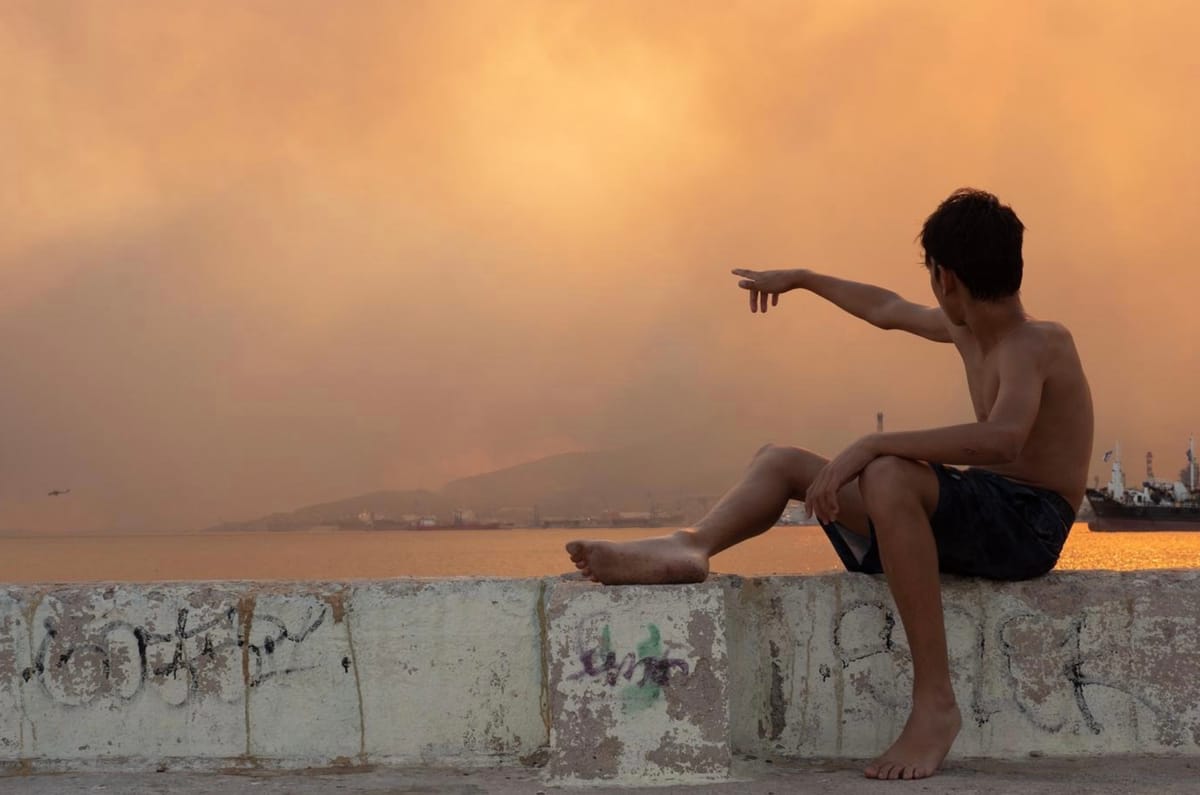Greece wildfires: A summer of catastrophe and conspiracy

By Felix Flanagan, BA Politics
“As Greece battles unprecedented wildfires, it is stories of arson and conspiracy that have captured the country’s popular imagination, rather than concern from the climate crisis.”
This summer Greece was ravaged by the worst wildfires since records began. Throughout the summer many parts of the country faced the perfect storm of high temperatures, dry conditions, and strong winds. The issue of the fires has understandably become a point of contention in Greek politics and society however, on a recent visit to the country I was shocked to learn the degree to which stories of arson dominate the narrative surrounding the fires, rather than climate change.
Michail, a fourth-year Political Science student in Athens, told me that the conspiratorial nature of the discourse has existed for at least four decades. It is instead the nature of these conspiracies that has changed. What began with stories of sheep farmers clearing land for grazing and Turkish spies hellbent on damaging the Greek tourism industry, he says, has morphed through Greece’s recent history of economic decline, political scandal, and migrant crisis. This has resulted in conspiracies of land grabs by wealthy elites, government plots to clear land for redevelopment, and the scapegoating of migrants and refugees. The conspiratorial discourse has been further inflamed by politicians and media, with the minister of Civil Protection blaming ‘lowlife arsonists’ and newspapers reporting on stories of illegal migrants committing arson and police impeding local efforts to tackle the blazes.
Mrs Panagiotis, an elderly woman who took us when we found ourselves stranded by the wildfires, informed me that her son, a police officer, also told her that the fires were started by illegal migrants. Greece’s main opposition party SYRIZA has warned that the right-wing government are militarising this anti-migrant sentiment to distract from their shortcomings in disaster prevention. This is of course conjectural, but it is true that in Greece 92% of the budget allocated to the wildfires went into suppressing the fires, with just 8% being spent on prevention, states UNDRR’s PreventionWeb.
Gogó, another Greek student I spoke to, told me these anti-migrant conspiracies are more prevalent in rural areas and closer to the Turkish border, where the migrant crises have been most visible. On the other hand, the majority of young, educated Greeks like herself believe that the wildfires are part of a government conspiracy to clear land for wind turbine farms.
The flames of this particular conspiracy have been fanned by stories of corruption surrounding the Mitsotakis family, a political dynasty that has been in power for 145 of the 200 years since the establishment of the modern Greek state.
Alexandra Mitsotakis, the Greek prime minister’s sister, is head of the ‘Convergences Greece Forum’ which lobbies for sustainable development in the public and private sectors in Greece. This connection has given impetus to stories that the government has allowed these fires to rage to clear land for wind turbines. Far-right journalist Giorgos Tragkas wrote on the matter; ‘The Mitsotakis quasi-state is emerging from the flames burning Greece.’ Despite what many outsiders might see many of these views as far-fetched, it seems that Greek audiences have been perceptive to this type of rhetoric.
Stories of conspiracy aside, analysis from the World Weather Attribution has suggested that the recent wildfires in Europe and America would have been ‘virtually impossible’ if not for human-caused climate change, which they estimate made the heatwaves 2.5C hotter in Europe this summer.
Despite this confidence from scientists, a culture of conspiracy and misleading information from media and politicians, following decades of political and economic turmoil, has left many Greeks incredibly mistrustful. This focus on blaming individuals over the climate crisis also allows politicians to get away with inaction on disaster prevention and combating climate change. Michail, the Greek student I spoke to, said he was struggling to see any way to fight the spread of these conspiracies.
The issue, however, is not entirely unique to the region. Around the world, we are seeing misinformation and conspiracy blurring the lines of reality and posing a significant danger to global efforts to reduce climate change.
Photo Caption: Elefsina, Greece 07.18.23: A young boy points at a helicopter fighting the Mandra forest fires as evacuations announced. (Credit: Shutterstock)



